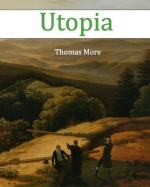“In their great council at Amaurot, to which there are three sent from every town once a year, they examine what towns abound in provisions and what are under any scarcity, that so the one may be furnished from the other; and this is done freely, without any sort of exchange; for, according to their plenty or scarcity, they supply or are supplied from one another, so that indeed the whole island is, as it were, one family. When they have thus taken care of their whole country, and laid up stores for two years (which they do to prevent the ill consequences of an unfavourable season), they order an exportation of the overplus, both of corn, honey, wool, flax, wood, wax, tallow, leather, and cattle, which they send out, commonly in great quantities, to other nations. They order a seventh part of all these goods to be freely given to the poor of the countries to which they send them, and sell the rest at moderate rates; and by this exchange they not only bring back those few things that they need at home (for, indeed, they scarce need anything but iron), but likewise a great deal of gold and silver; and by their driving this trade so long, it is not to be imagined how vast a treasure they have got among them, so that now they do not much care whether they sell off their merchandise for money in hand or upon trust. A great part of their treasure is now in bonds; but in all their contracts no private man stands bound, but the writing runs in the name of the town; and the towns that owe them money raise it from those private hands that owe it to them, lay it up in their public chamber, or enjoy the profit of it till the Utopians call for it; and




